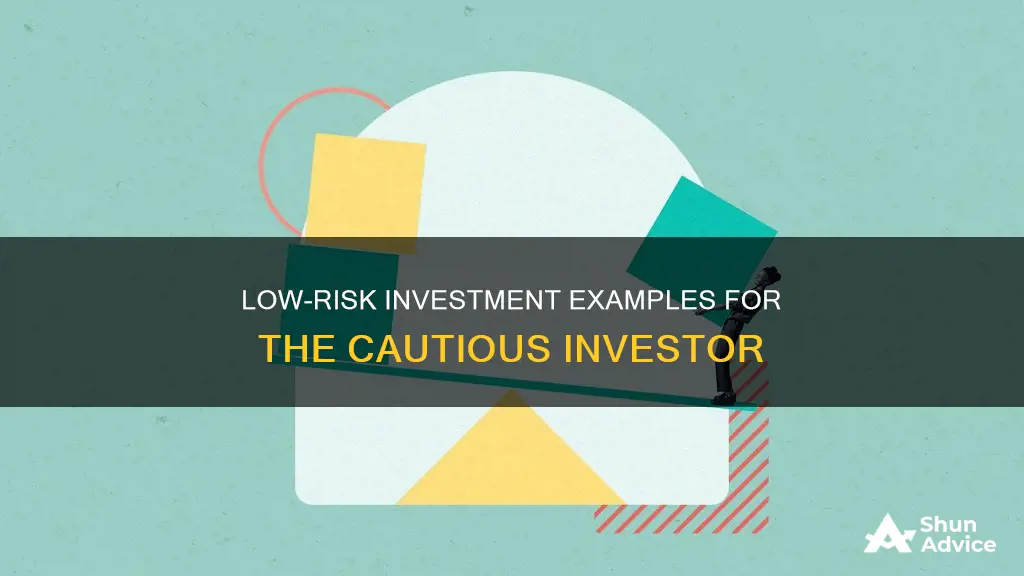
Low-risk investments are a great way to preserve capital and maintain a steady flow of interest income. While they may not provide high returns, they play a crucial role in a diversified portfolio, offering stability, predictable income, and protection against market volatility. Here are some examples of low-risk investments:
1. Money Market Accounts: These are savings accounts that offer a higher interest rate than traditional savings accounts and allow for a limited number of transactions per month. They are FDIC-insured, guaranteeing deposits of up to $250,000 per institution per investor.
2. High-Yield Savings Accounts: These accounts offer higher interest rates than regular savings accounts, often by operating strictly online, and are FDIC-insured.
3. Cash Management Accounts: Offered by non-bank financial institutions, these accounts behave similarly to online savings accounts and are FDIC-insured through partnerships with banks.
4. Certificates of Deposit (CDs): CDs are FDIC-insured investments that offer fixed interest rates over a set period. They typically have higher rates than savings accounts but early withdrawal may result in penalties.
5. Treasury Securities: These include Treasury bills, notes, and bonds, which are backed by the US government and considered risk-free. Treasury Inflation-Protected Securities (TIPS) are a type of Treasury security that adjusts with inflation, providing a hedge against inflation.
6. Bond Funds: These are portfolios of various bonds packaged into mutual funds or ETFs, offering diversification and reduced risk. They provide steady returns but may have lower management fees and higher tax implications than other investments.
7. Municipal Bonds: Municipal bonds are funded by tax collections or government revenues and can offer tax-free income, making them attractive to investors in higher tax brackets. However, they may have lower liquidity due to a less active secondary market.
8. Annuities: Annuities are insurance products that provide fixed, steady income in return for an upfront investment. They are ideal for older individuals seeking a guaranteed income stream but offer minimal liquidity as funds are often locked up.
9. Preferred Stocks: These hybrid securities combine features of stocks and bonds, offering a fixed dividend and higher priority in dividends and liquidation. They are traded on stock exchanges, providing liquidity, but generally do not come with voting rights.
| Characteristics | Values |
|---|---|
| Returns | Low |
| Risk | Low |
| Safety | High |
| Liquidity | High |
| Accessibility | High |
| Volatility | Low |
| Inflation protection | Yes/No |
| Tax advantages | Yes/No |
| FDIC-insured | Yes/No |
What You'll Learn

High-yield savings accounts
To open a high-yield savings account, simply choose a bank that offers this option and sign up. It's worth noting that online banks often provide more attractive rates than traditional brick-and-mortar banks due to their lower overhead expenses. Additionally, some accounts today offer interest rates exceeding 4%, which is higher than the current rates on certificates of deposit. However, these high-interest accounts are often digital-only institutions, so consider keeping some funds in a local bank if you need quick access to your cash.
While high-yield savings accounts offer higher interest rates than regular savings accounts, it's important to remember that the returns are still quite low compared to other investment options. Additionally, some banks may charge account fees, so be sure to read the fine print before opening an account.
Key Objectives of Investment Management Strategies
You may want to see also

Money market funds
Because their underlying investments are usually of high quality, they are generally less volatile than other types of mutual funds, such as stock funds. Money market funds offer diversification and liquidity. The income received from investing in a money market fund will fluctuate up and down based on the yields available on the securities. It is important to note that money in a money market fund is not protected by the Federal Deposit Insurance Corporation (FDIC) or the National Credit Union Association (NCUA).
While money market funds are considered very low-risk, they are not entirely risk-free. There have been rare instances where money market funds have dropped below the target of $1 per share, resulting in losses for investors. However, regulatory changes have been implemented to increase their stability since the 2008 financial crisis.
Crafting a Board Game: Investing and Winning
You may want to see also

Short-term certificates of deposit
CDs provide reliable, fixed-rate returns on a lump sum of money over a fixed period, such as 6 months, 1 year, or 5 years. They can be purchased at banks or credit unions, where they are insured by the FDIC or the National Credit Union Association (NCUA). These CDs typically require a minimum deposit, and you will be charged a penalty if you withdraw your money before the CD matures.
An alternative to traditional CDs is brokered CDs, which are issued by banks for customers of investment and brokerage firms. Brokered CDs are usually purchased in large amounts by the brokerage, which then divides them into smaller parts for resale. The broker's underlying CD purchase from the bank is insured, and in the rare case that insurance is needed, it will flow from the bank to the brokerage to the investor.
Brokered CDs can be bought and sold on the secondary market before they mature, but this will incur trading fees and the price received may be below the original purchase price. They are subject to the same FDIC limits as traditional CDs, but buying them through a brokerage firm can help expand the amount of FDIC protection inside a brokerage account by purchasing multiple brokered CDs from different issuers.
When considering a short-term CD, it is important to keep in mind the potential risks associated with this investment option. One such risk is reinvestment risk, which means that when your CD matures, you may need to reinvest the funds at a lower interest rate if rates have fallen since your initial investment. Another risk is inflation risk, as the fixed interest rates of CDs may not keep up with inflation, resulting in a decrease in the purchasing power of your investment. Additionally, there is an opportunity cost to consider. By locking your funds into a CD, you may miss out on potential gains from other investment opportunities, such as stocks or bonds, which could offer higher returns over the same period.
To mitigate these risks, it is crucial to diversify your portfolio and consider short-term CDs as part of a broader investment strategy rather than relying solely on them for your financial goals. This can include long-term CDs or other low-risk investments. Additionally, it is important to adopt a strategic approach, explore competitive offers from different institutions, and stay informed about market conditions and interest rate trends.
Understanding Investment Management Services: Strategies for Success
You may want to see also

Cash management accounts
- Interest Rates: CMAs typically offer higher interest rates than traditional bank savings accounts, which can lead to greater cash flow. The interest rates on CMAs vary with market rates and can rise or fall.
- Insurance: Cash management accounts are generally insured by the Federal Deposit Insurance Corporation (FDIC) or the Securities Investor Protection Corporation (SIPC). The FDIC provides up to $250,000 of coverage per account, while the SIPC protects the value of your investments and cash up to $500,000, including $250,000 for cash. Many CMAs also offer additional insurance through other providers.
- Fees and Minimums: Some CMAs may have high monthly management fees, minimum balance requirements, or limits on withdrawals. It's important to carefully review the terms and conditions before opening an account.
- Convenience: CMAs offer the convenience of consolidating all your banking and investing activities under one roof. They also provide easy transfers between investment and CMA accounts.
- Alternative Options: CMAs are not the only option for short- to medium-term savings. Some alternatives include certificates of deposit (CDs), high-yield money market accounts (MMAs), and online savings accounts.
- Taxation: Interest income earned on CMAs is generally taxed as ordinary income. This means you will owe taxes on the interest you earn at your marginal tax rate.
Overall, cash management accounts can be a good option for those seeking higher interest rates and additional features compared to traditional bank accounts. However, it's important to carefully consider the fees, minimums, and other terms and conditions before opening an account.
Engaging Employees: Strategies for Building Investment and Commitment
You may want to see also

Treasury securities
The US government also offers Treasury Inflation-Protected Securities (TIPS). TIPS are unique because their principal value adjusts with inflation or deflation, as measured by the Consumer Price Index (CPI). While TIPS can protect your investment from inflation, their interest rates are often lower than other Treasury securities. TIPS also carry the same risks as other Treasury securities, such as interest rate risk and call risk.
You can purchase Treasury securities through various channels, including banks, credit unions, brokerages, or directly from the government through the TreasuryDirect program. When considering this investment option, it's important to remember that there is a trade-off between risk and potential returns. Treasury securities are suitable for investors seeking capital preservation and stable, yet modest, returns.
Crafting an Annual Investment Plan: Strategies for Success
You may want to see also







